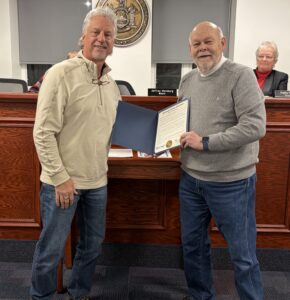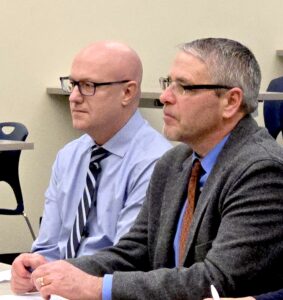Small shops treading water in virus era

OBSERVER Photo Scott Axelson says a lack of supplies due to the coronavirus is hampering his Clear View Pools & Spas store.
JAMESTOWN — Scott Axelson, like other area small business owners, is battling a wave of obstacles when it comes to overseeing his retail shop in this age of uncertainty caused by the coronavirus. It began with a sudden economic shutdown in New York state that started in the middle of March and lasted to the end of May.
Now, a different set of circumstances is presenting a whole new challenge: a lack of certain supplies and inventory. Without these items, Axelson is missing out on some of the most profitable times for his business of Clear View Pools & Spas on Fairmount Avenue.
In some cases, things for Axelson have slowed to a trickle.
Oddly enough, however, it has nothing to do with the lack of consumer demand. With many still sensing the safest place to be is at home, numerous people have inquired about purchasing in-ground and above-ground pools as well as the accessories that come with them, including motors, liners, filters and heaters.
According to Axelson, those items are in short supply due to restrictions with manufacturing.
“(Companies) can’t add the second or third shifts fully because of social distancing and also they have to clean more,” Axelson said of major pool suppliers. “They cannot produce themselves out of the problem.”
That takes a huge toll on revenues. Without question, pool stores are not alone.
Across America, small business is looking for any type of lifeline. You see it in restaurants, which have always had low profit margins, that have embraced the take-out mantra and have implemented a policy of allowing fewer patrons in their establishments at this time. You see it with many small shops, which enforce policies for customers to wear masks.
Throughout the COVID-19 grip, we have always been told the stay at home and spatial distancing orders would end. Even when state Gov. Andrew Cuomo gave his daily addresses that were viewed by millions in March and April, “temporary” was a popular word.
Today, many are resigned to the fact that this is just how we will have to live until a vaccine can be found. For any business, that can lead to a major shift in delivering goods and services.
Small business in Chautauqua and Warren counties are a major component to our local economies. You see it in our downtowns from Dunkirk-Fredonia to Jamestown to Warren.
But government does not even attempt to make it easy. Even locally, Chautauqua County legislators this week seemed content with keeping an 8% sales tax, which is regressive. They also will likely look at raising property taxes in the next year. Knowing that sales tax revenue has been decreasing as much as 35% in recent months locally means someone will have to make up for the missing revenue.
That will ultimately be the taxpayer — and small businesses that include manufacturing, retail and restaurants. All together, an article by McKinsey & Company noted, these service sectors account for approximately 30% of small-business jobs in the United States.
If those shops do not survive, then consumers and workers are impacted.
Axelson is finding his way, however, through this significant and historical shift. On Thursday, he was in Cattaraugus County on a repair call while also doing maintenance on a number of area pools in the Jamestown and Bemus Point areas. “I am doing a lot more service work and trying to pick up more customers in the field,” he said. “That’s why I have restricted store hours because I’m working outside the shop more.”
He’s grateful for the current opportunities, but has had to pick up another full-time job to assist with cash flow as Clearview Pools maintains, but cannot grow without key supplies.
“We have people coming in every day looking for pools,” he said, noting there is an expectation in the industry some products will not be shipped until 2021. “You cannot buy above-ground pools.”
That may not bode well for the future. Larger stores and outlets will always have the upper hand when it comes to getting the inventory.
“If I can’t buy anything but chemicals … so then you have to look at your business model,” said Axelson, noting his busiest time is from April to September. “It’s a total re-evaluation of how to run a seasonal business.”
John D’Agostino is the regional editor of the OBSERVER, The Post-Journal and Times Observer in Warren, Pa. Send comments to jdagostino@observertoday.com or call 366-3000, ext. 253.




